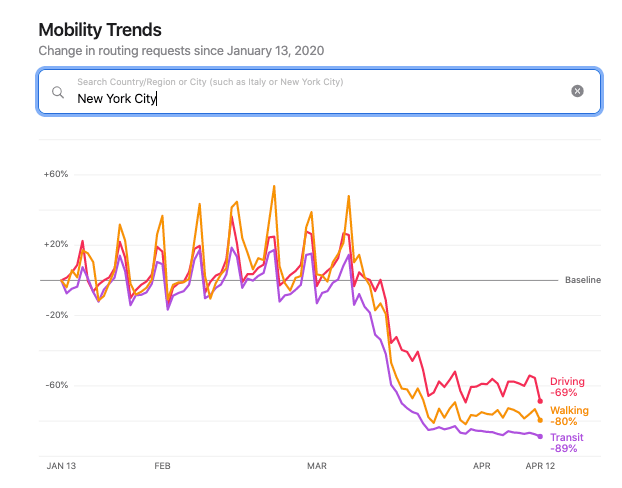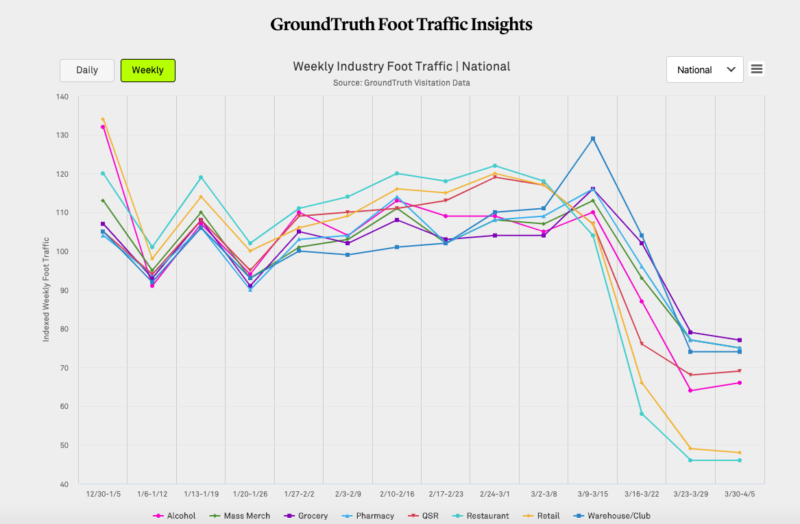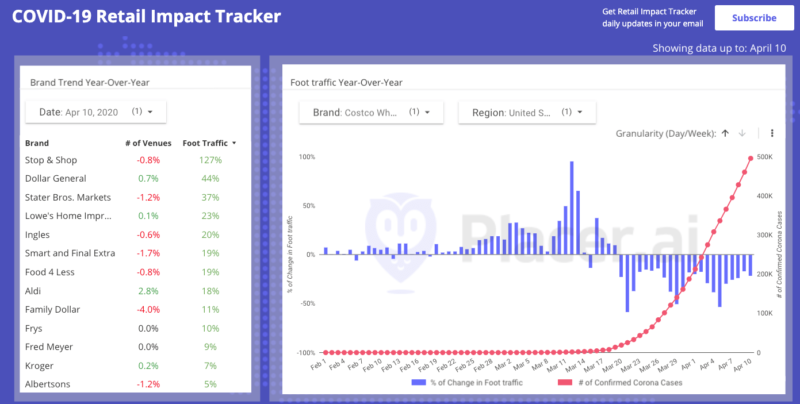Location data providers showcase real-world analytics tools during COVID-19
Apple has released a new Mobility Trends tool. Google has Mobility Reports. Both are showing the positives on location tracking.
Coronavirus has brought the value of mobile location data into public awareness in a very concrete way. Not too long ago, the idea was these data amounted to “tech-company surveillance,” a very negative sentiment. But use cases during this crisis have changed that perspective.
Here are a few recent applications and happenings in the space
Apple Mobility Trends
Apple has released a new Mobility Trends tool that shows the impact of shelter-in-place rules on user movements in multiple countries and selected cities. The data, which the company says is anonymous and aggregated, comes from Apple Maps navigation.
The tool allows users to see how the virus and corresponding lockdowns have impacted walking, driving and transit compared with a baseline measurement in January. The data is being updated daily.

For public health officials it’s potentially useful but for others, not as much. The data isn’t specific enough to offer much insight for digital marketers or brands.
Google Mobility Reports
In the slightly more useful category for marketers is Google’s Mobility Reports, which was released a couple of weeks ago.
Google’s reports cover 131 countries and examine visitation and movement patterns in high-level categories, such as retail, grocery, transit and workplace. Google says “this type of aggregated, anonymized data could be helpful [to public health officials] as they make critical decisions to combat COVID-19.” (Google and Apple have also partnered on COVID-19 contact tracing using location data.)
Indeed, but what these reports tell us, mostly, is something we know from our own experience: people aren’t going to restaurants and retail stores right now. Frankly, Google Trends is much more useful to track changing search behavior and evolving user demand.
More granular data
Some of the tools and datasets offered by other location intelligence companies present more in-depth information and point to the utility of location data for a wide range of use cases. In this moment, when location is being used to illustrate the pandemic’s impact and our response, these companies can educate the broader market about the capabilities and potential value location data has offer.

Foursquare, for example, has been reporting on offline activities and behavioral trends on its blog. The company takes a more granular look at business categories and activities, such as drug store or QSR visitation patterns by region. NinthDecimal offers a similar look at business categories in a series of COVID-19 impact reports (registration required).
GroundTruth recently launched a dynamic foot traffic insights tool that allows users to explore and compare visitation in eight business categories, weekly or daily, and isolate those trends on a regional basis. Another company in this segment, Cuebiq, offers an interactive map that provides a more precise geographic view of movement (at the city level) but not by business category.
Tracking patterns in retail
For its part, InMarket uses mobile-location data to create research reports that offer location-based insights into changing consumer shopping patterns (e.g., day part, duration, frequency) and purchase behavior at the product level.
Placer.ai gives you the ability to compare visitation trends for dozens of individual retailers by day and by region. It answers the question: which stores are people still going to and which stores have seen the biggest declines in foot traffic?

What’s next
In just the past two weeks, four companies in this segment have combined: Foursquare and Factual and PlaceIQ and Freckle IoT. The economy and the need for more competitive scale will compel other acquisitions and mergers in the coming months, as location intelligence companies position themselves for the reopening of the real world.
Contributing authors are invited to create content for MarTech and are chosen for their expertise and contribution to the search community. Our contributors work under the oversight of the editorial staff and contributions are checked for quality and relevance to our readers. MarTech is owned by Semrush. Contributor was not asked to make any direct or indirect mentions of Semrush. The opinions they express are their own.
Related stories